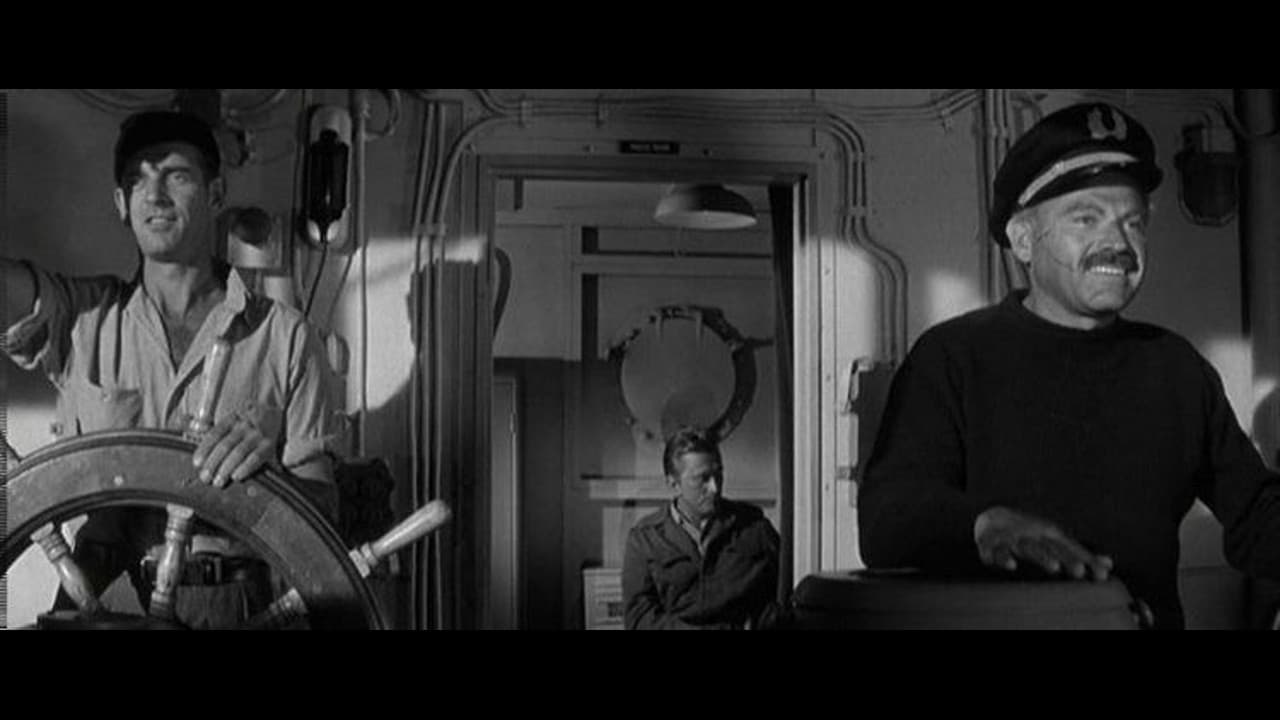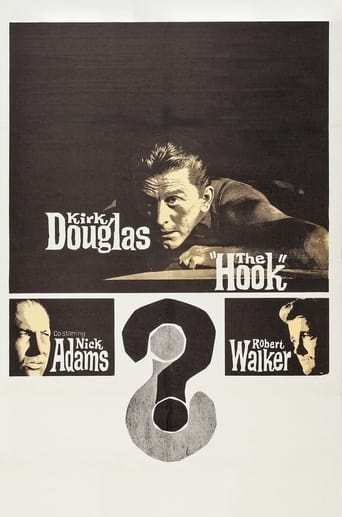

Directed by George Seaton, with a screenplay by Henry Denker that was based on a novel by Vahé Katcha, this intense Korean War drama appropriately features Kirk Douglas as Sergeant P.J. Briscoe, who's tasked with executing a North Korean pilot prisoner he refers to as 'the gook' (Enrique Magalona, in one of only three films in which he appeared). The prisoner, who had just killed Lieutenant Troy (Mark Miller) in a bombing raid before crash landing himself, is humanly rescued by Private O.A. Dennison (Robert Walker Jr., son of his same named actor father and actress Jennifer Jones, in his film debut), who's more intelligent than your 'average joe'. Nick Adams plays Pvt. V.R. Hackett, the only other member of this group, who's beholden to Briscoe for reasons to be revealed. The military personnel were collecting a stash of fuel which has to be transported to where it's needed by a civilian charter vessel, run by Finnish Captain Van Ryn (Nehemiah Persoff). When Briscoe calls into HQ, he learns that a school and a hospital were just bombed by the enemy and is ordered, by the South Korean officer now in charge, to dispose of his prisoner of war, who Van Ryn had made bunkmate of the others. So, the film is an emotional and psychological thriller as the three discuss the required act and the fate of their prisoner.Briscoe has but a short time left to serve before he can retire at 40 with a full pension, even though he has no one to go home to, as Dennison discovers. He's a hard man whose father and military experience has convinced him that weakness means death. Briscoe has taken Dennison under his wing, but rides him while trying to instill these same values. At the same time, Briscoe has 'control' of Hackett, who used to be a Corporal but was bucked down to Private by the Sergeant who was 'protecting' him after a drunken brawl with another officer; this, however, turns out to have been a self serving act. At different times, each of the men tries to kill the prisoner, but each finds killing another man face-to-face more difficult than expected. Dennison is the humanist whose words 'work' on the other two and the two Privates actually try to free their prisoner. The ship's captain and crew doesn't get involvement per their neutrality in the conflict. Later, when Briscoe is about to report their combined insubordination to their superiors, they learn that a cease-fire had been called, effectively letting them off 'the hook' for not following orders. But they'd left their prisoner alone; knowing his fate, he escapes and then tries to sabotage the ship full of oil barrels. The language barrier not only prevents the Americans from telling the North Korean about the armistice, but it leads to his own tragic ending.
... View MoreI enjoy watching movies and will most often make a selection because of the actors, then maybe because of the theme, or occasionally because of a recommendation. "The Hook" is a movie that I had never heard of, so seeing Kirk Douglas on the cover is what hooked me for this war movie. Also Robert Walker Jr is someone that I first saw in TV's _"Star Trek" (1966) {Charlie X (#1.2)}_ (qv) playing a 17yr boy, so what would he be like in a movie produced 3 years earlier.The opening of this movie includes "This is a story of men in war, not men at war. And the two are not the same." To understand my view, I am a baby-boomer who has never served in the military, but I have known many who have served. Most of these men don't really talk about their experiences, so I often wonder if my views on war movies would be very different of those people who have served. My preference would be that countries would not be at war, but regardless of this I believe we need to support those who chose to serve in the roles in which they are assigned."The Hook" is a title that showed no relevance before I watched the movie, and I never did catch. Is this an anti-war movie, or a personal interaction story, or war conflict drama, and this question repeats itself for 90 minutes. Regardless the movie itself is compelling. We are engaged with three surviving servicemen vacating a military post upon a 'neutral' merchant vessel, plus an enemy retrieved after he has bailed from his failing aircraft. Your journey is to imagine your response to their scenarios. Would you have rescued the enemy at all? How would you treat him on this merchant ship? Just imagine how you would respond to engaging an enemy on the battlefield; how is it different or the same, across an eating table? Kirk Douglas, Robert Walked, and Nick Adams are the enlisted men facing these scenarios.I enjoyed this movie, in spite of moments of "I wouldn't do that!". The movie is a must for Kirk Douglas fans, and highly recommended for anyone interested in war movies. I don't know if actual enlisted people would behave this way, but "The Hook" is wonderfully acted and does not need the tonnage of special effects that are today's production norms.
... View MoreFor fans of the taut and psychologically grueling and philosophically provocative filmed one-act play, The Hook is right in the class of Lifeboat, The Petrified Forest, Obsession, The Desperate Hours, 12 Angry Men, and Time Limit -- all among my personal favorite movies. The movie hinges on one dilemma: What does a military man do when given a direct order from a Commanding Officer to kill an unarmed POW in cold blood? The questions of right and wrong are further blurred by the fact they are informed that all the other soldiers in the unit have all been wiped out by a brutal North Korean attack. Aboard a friendly vessel en route to reconnoiter with another fighting division, a Sergeant (Kirk Douglas), Corporal (Nick Adams), and Private (Robert Walker Jr.) have two days to dispose of the prisoner or disobey a direct order. For his part, the prisoner shows every sign of singlemindedly waiting for an opening to escape. He speaks no English and only one of the three speaks even a few words of Korean. The Sergeant orders each subordinate, in turn, to execute the prisoner, but they are both quite conflicted also. Kirk Douglas is perfectly cast as the tough-as-nails-on-the-outside-Sergeant Briscoe. But, Nick Adams truly steals the movie as the Corporal who nearly relinquishes his humanity trying desperately to support his Sergeant. Walker gives a solid if unremarkable performance as the Private that Briscoe relentlessly tries to bully into executing his dirty work. That's all of it. So, if you are looking for a war movie with lots of action and visual effects, look elsewhere. But, if you wish to look into the souls of three enlisted men faced with Hobson's choices within an unrelenting pressure cooker, this fast-moving and well-acted psychological study will haunt you for the rest of your film-going life. I give it 10/10 for its genre.
... View MoreKirk Douglas runs the gamut of emotion from about A to C, and most of the rest of the performances are similarly limited. In other words, some better actors would have made this a better picture. The most convincing performance comes from Enrique Mangalona as the POW, who, speaking no English, is almost silent throughout.It's by no means action-packed. The action all takes place on board a neutral ship, on which three US servicemen wrestle with their consciences which get in the way of their murdering a Korean POW.It's a psychological think-piece, but it's tense and quite involving. It's not in the class of Twelve Angry Men, but it's that sort of genre.Not worth staying in for, or renting the video, but very likely better than the crud on the other channels, given that it's most likely to be shown as a space filler in the small hours.
... View More